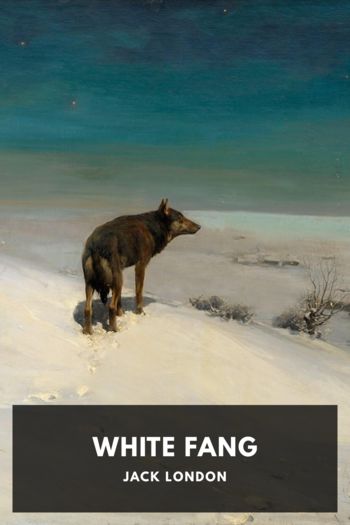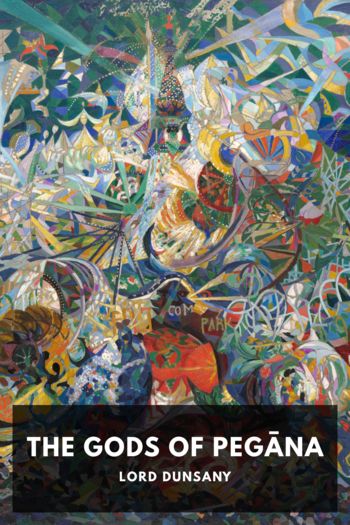White Fang, Jack London [story reading txt] 📗

- Author: Jack London
Book online «White Fang, Jack London [story reading txt] 📗». Author Jack London
He gave a great start of fright. A colossal and formless something was rushing across the field of his vision. It was a tree-shadow flung by the moon, from whose face the clouds had been brushed away. Reassured, he whimpered softly; then he suppressed the whimper for fear that it might attract the attention of the lurking dangers.
A tree, contracting in the cool of the night, made a loud noise. It was directly above him. He yelped in his fright. A panic seized him, and he ran madly toward the village. He knew an overpowering desire for the protection and companionship of man. In his nostrils was the smell of the camp-smoke. In his ears the camp-sounds and cries were ringing loud. He passed out of the forest and into the moonlit open where were no shadows nor darknesses. But no village greeted his eyes. He had forgotten. The village had gone away.
His wild flight ceased abruptly. There was no place to which to flee. He slunk forlornly through the deserted camp, smelling the rubbish-heaps and the discarded rags and tags of the gods. He would have been glad for the rattle of stones about him, flung by an angry squaw, glad for the hand of Grey Beaver descending upon him in wrath; while he would have welcomed with delight Lip-lip and the whole snarling, cowardly pack.
He came to where Grey Beaver’s tepee had stood. In the centre of the space it had occupied, he sat down. He pointed his nose at the moon. His throat was afflicted by rigid spasms, his mouth opened, and in a heartbroken cry bubbled up his loneliness and fear, his grief for Kiche, all his past sorrows and miseries as well as his apprehension of sufferings and dangers to come. It was the long wolf-howl, full-throated and mournful, the first howl he had ever uttered.
The coming of daylight dispelled his fears but increased his loneliness. The naked earth, which so shortly before had been so populous; thrust his loneliness more forcibly upon him. It did not take him long to make up his mind. He plunged into the forest and followed the river bank down the stream. All day he ran. He did not rest. He seemed made to run on forever. His ironlike body ignored fatigue. And even after fatigue came, his heritage of endurance braced him to endless endeavour and enabled him to drive his complaining body onward.
Where the river swung in against precipitous bluffs, he climbed the high mountains behind. Rivers and streams that entered the main river he forded or swam. Often he took to the rim-ice that was beginning to form, and more than once he crashed through and struggled for life in the icy current. Always he was on the lookout for the trail of the gods where it might leave the river and proceed inland.
White Fang was intelligent beyond the average of his kind; yet his mental vision was not wide enough to embrace the other bank of the Mackenzie. What if the trail of the gods led out on that side? It never entered his head. Later on, when he had travelled more and grown older and wiser and come to know more of trails and rivers, it might be that he could grasp and apprehend such a possibility. But that mental power was yet in the future. Just now he ran blindly, his own bank of the Mackenzie alone entering into his calculations.
All night he ran, blundering in the darkness into mishaps and obstacles that delayed but did not daunt. By the middle of the second day he had been running continuously for thirty hours, and the iron of his flesh was giving out. It was the endurance of his mind that kept him going. He had not eaten in forty hours, and he was weak with hunger. The repeated drenchings in the icy water had likewise had their effect on him. His handsome coat was draggled. The broad pads of his feet were bruised and bleeding. He had begun to limp, and this limp increased with the hours. To make it worse, the light of the sky was obscured and snow began to fall—a raw, moist, melting, clinging snow, slippery under foot, that hid from him the landscape he traversed, and that covered over the inequalities of the ground so that the way of his feet was more difficult and painful.
Grey Beaver had intended camping that night on the far bank of the Mackenzie, for it was in that direction that the hunting lay. But on the near bank, shortly before dark, a moose coming down to drink, had been espied by Kloo-kooch, who was Grey Beaver’s squaw. Now, had not the moose come down to drink, had not Mit-sah been steering out of the course because of the snow, had not Kloo-kooch sighted the moose, and had not Grey Beaver killed it with a lucky shot from his rifle, all subsequent things would have happened differently. Grey Beaver would not have camped on the near side of the Mackenzie, and White Fang would have passed by and gone on, either to die or to find his way to his wild brothers and become one of them—a wolf to the end of his days.
Night had fallen. The snow was flying more thickly, and White Fang, whimpering softly to himself as he stumbled and limped along, came upon a fresh trail in the snow. So fresh was it that he knew it immediately for what it was. Whining with eagerness, he followed back from the river bank and in among the trees. The camp-sounds came to his ears. He saw the blaze of the fire, Kloo-kooch cooking, and Grey Beaver squatting on his hams and mumbling





Comments (0)